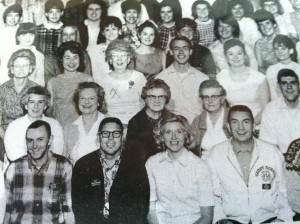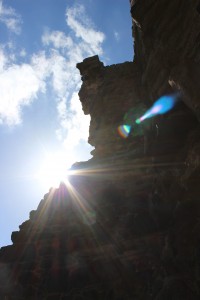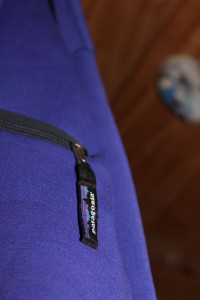My friend Christian died in the Austrian Alps this past spring, caught in an avalanche. Jane Larson was struck by a falling rock in July and is alive and healing, but it could have gone either way. Spend enough time in the mountains and you’ll begin to compile an “in remembrance” list of those who died young. The rest of us who venture out all have “almost” stories, enough to write a book, because to go high in the moutains is to move to the realm of uncertainty. You can mitigate the risk to nearly nothing, but like the rest of life (taking a bath, walking down stairs, going shopping), the risk is never zero. The difference, though, between risk in civilization and risk in the wild has to do with the awareness of it.
“Why go then?” is the question I’m asked, often. There are plenty of reasons, but the one for this moment is to say that I go to peer over the edge. Our sanitized world, with illusions of safety and nightly news reports of disasters far and near, has created an obsession with personal security, and this fixation has, ironically, has left us feeling anxious and powerless. As we result we’re living less and guarding more – bigger walls and less generosity, more privacy and fewer friends, better insulation and more illness, hypochondria, insomnia, and all the rest that comes to those who live in cages.
In contrast, those who leave the confines of civilization, are rewarded, the farther and higher they travel from predictably, with what one author calls the “the raw and urgent joy of life”. Such ventures don’t require irresponsibility. Far from it, the truth is that those who leave the illusion of safety behind and face the unfiltered risks of the wild are more attuned to life, not less. Climbing invites focus because of the knowledge that mistakes can be life or death here. When it’s over, the hyper-awareness of everything lingers, as the taste of food, the colors of sky and flora, sounds, smell, seem intensified – and we feel more alive. Soon, though, if we’re not careful, we’re find ourselves getting all worked up again over a broken traffic light, or long line at the store. Ugh – is there a way to know awareness, joy, and real life in the midst of the faux security all around us?
The question begins to rub up against the gospel. The “big city life” as Mattafix calls it, seems to kill vitality, offering more illusion, fantasy, and escape, than reality. What’s person to do? Though I could tell you to go climbing, there’s actually a better answer:
FOLLOW JESUS
I can hear you laughing, see you rolling your eyes, see your hand reaching for the mouse to move on. Give me a moment to make three observations about why this is the first and best thing we can do:
Abundant Life is why Christ came. Jesus didn’t begin his kingdom thing so that we’d sit around and pontificate about the finer nuances of Christology, argue about who’s in and who’s out, and pretend to be holier than we are. He tells us the express reason that he came was so we’d have a capacity to live richer lives. Abundant life gets embodied as the book of Acts unfolds, and what it seems to mean is “life poured out” in careless loving abandon, like that lady did with the perfume on Jesus’ feet. I say this because at the end of chapter 7 in Acts, one man has been killed for inviting people into God’s story. In chapter 8 God’s shoving people out of their comfort zone, sending Jewish Christ followers into places that, to their hearts, would have been more threatening and oppressive than K2 (the mountain, not the company). They go – and find joy and power and abundance. Soon there’s another one of their own murdered – beheaded. Next, the famous apostle Peter is on the run, with a price on his head. A group of people go out on a sea tour to various cities to share the good news of Christ and in the process there’s more rioting, and a key apostle is so injured that he’s presumed to be dead, except he’s not. Riots, escapes, rejection, acceptance, parties, healings, confrontation 0 every day’s an adventure.
This isn’t about the fact that these people were part of a start-up, or on a mission trip, though both are true. This is about the reality that following Jesus will infuse us with a certain quality of life, and that life will lead to certain attitudes, behaviors, interactions… all of which will enable us to peer over the edge, and thus know what it means to be fully alive. This is as available to the barista, as the mountaineer, as the mom with small children – available, and elusive. Why is this elusive? Because of the second observation:
Abundant Life must be sensual life. Jesus’ big complaint was that most people had become deaf and blind, even though they still had perfectly good ears and eyes. This is an important observation on the part of Jesus because he’s telling us that we need to see, hear, mourn, dance, feast, fast. We need, in other words, to wake up to the whole that is our lives. This is harder than it appears.
It means that we need to be open to pain and loss. Jesus spelled this out clearly when he said, “he who seeks to save his life will lose it”, which was his way of saying that if we choose the route of preservation over the route of obedience, we’ll miss the abundance and adventure that is life in Christ. Losing one’s life simply means taking every next step simply because it’s the right step take, rather than because it’s the safe step.
A prayer found in a soldier’s pocket reads:
“The first prayer I want my son to learn to say for me is not, ‘God, keep my Daddy safe’, but ‘God, make Daddy brave, and if he has hard things to do, make him strong to do them’. Son, life and death don’t matter, but right and wrong do. Daddy dead is Daddy still. But Daddy dishonored before God is something too awful for words. I suppose you’d like to put in something about safety too and Mother would like it too. Well, put it in afterwards, always afterwards. For it really doesn’t matter as much as doing what is right.”
This is the sensual life, precisely because in doing the right thing, step by step, you’re opening yourself to the full range of life experience: celebration and confrontation, gain and loss, mourning and dancing, acceptance and rejection, ecstasy and agony, life and death. The point, it seems, is that you can’t live the fulness of this by carefully avoiding risk – it will shut down the options and leave you with a range of experiences in the middle, but nothing on the ends. You don’t need to seek experiences on the ends… just seek to live in relationship with Jesus and follow him – the breadth of experiences will come.
This kind of living requires risk. The problem, of course, is that you don’t know your role in God’s story until you step on the stage. Will you live in one house your whole life, or move 20 times? Will you never go to the doctor, or face a rash of unknown illnesses? Rich or poor? Married or single? Mountains or ocean, or jail, or the streets, or CEO? The risk is that there’s no straight line between doing the right thing and the American values of security, upward mobility, and good health.
“Thanks… but I prefer stability, security, predictability. I’m allergic to rain. My family lives nearby, so I’ll never move. The biggest car is the safest one, so who cares about the environment? I need six figures to live a meaningful life.” Well, there you have it. Go for it. Just know that you might not reach your goal of long life and insulation from pain anyway, because, like living in the city, your insistence on control only offers the illusion of risk-free living, not the real thing. Since there’s risk either way, why not cut the line, and let the wind of the spirit take you out into the deep waters of abundant life… wherever they might lead.
Share a story in the comments section of how God is helping you embrace risk, large or small. Thanks!











